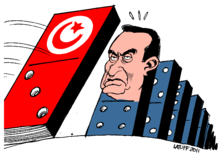موج انقلابی
موج انقلابی یا دهه انقلابی مجموعهای از انقلابهایی است که در مکانهای مختلف در یک بازه زمانی مشابه رخ میدهند. در بسیاری از موارد، انقلابهای گذشته و موجهای انقلابی الهامبخش انقلابهای کنونی بودهاند یا یک انقلاب اولیه الهامبخش دیگر «انقلابهای وابسته» همزمان با اهداف مشابه بودهاست.[۱][۲] علل موجهای انقلابی موضوع مطالعه تاریخنگاران و فیلسوفان سیاسی از جمله رابرت روزول پالمر، کرین برینتون، هانا آرنت، اریک هوفر و ژاک گودشوت شدهاست.[۳]

نویسندگان و فعالان، از جمله جاستین ریماندو و مایکل لیند، از عبارت «موج انقلابی» برای توصیف انقلابهای گسستهای استفاده کردهاند که در یک بازه زمانی کوتاه اتفاق میافتند.[۴][۵][۶]
جستارهای وابسته ویرایش
منابع ویرایش
- ↑ Mark N. Katz, Revolution and Revolutionary Waves, Palgrave Macmillan (October 1, 1999)
- ↑ Nader Sohrabi, Revolution and Constitutionalism in the Ottoman Empire and Iran, Cambridge University Press, 2011 pp. 74, 83, 87, 90, 94, 96, شابک ۰−۵۲۱−۱۹۸۲۹−۱, شابک ۹۷۸−۰−۵۲۱−۱۹۸۲۹−۵
- ↑ Colin J. Beck, Dissertation submitted to Stanford University Department of Sociology graduate Ph.D program, March 2009, "Ideological roots of waves of revolution," ProQuest, 2009, pp. 1-5[پیوند مرده], شابک ۱−۱۰۹−۰۷۶۵۵-X, 9781109076554.
- ↑ Justin Raimondo, "The Revolutionary Wave: Tunisia, Egypt, Yemen – is the West next?", Antiwar.com, January 28, 2011 - "The revolutionary wave now sweeping the world will not exempt America, in spite of the myth of 'American exceptionalism.'".
- ↑ Frank B. Tipton, A history of modern Germany since 1815, University of California Press, 2003, p. 82, شابک ۰-۵۲۰-۲۴۰۴۹-۹, شابک ۹۷۸−۰−۵۲۰−۲۴۰۴۹−۰ Chapter 3: A Revolutionary Generation: The 1840s and the Revolutions of 1848 - "A rising revolutionary wave?"
- ↑ Michael Lind, Vietnam, the Necessary War: A Reinterpretation of America's Most Disastrous Military Conflict, Simon and Schuster, 2002 p 37 شابک ۰−۶۸۴−۸۷۰۲۷−۴, شابک ۹۷۸−۰−۶۸۴−۸۷۰۲۷−۴ - "The revolutionary wave effect produced by the fall of Saigon in 1975 was far more significant than the regional domino effect in Southeast Asia proper. [...] Mark N. Katz has identified a 'Marxist-Leninist revolutionary wave' that peaked in the 1960s and 1970s, along with an 'Arab nationalist revolutionary wave' that began with the [1978-1979] Iranian Revolution. Samuel P. Huntington has identified a 'democratic wave' that began with the defeat of the Soviet bloc in the Cold War. [...] The Marxist-Leninist revolutionary wave associated with the Vietnam War saw 'affiliate Marxist-Leninist revolutions' come to power outside of Indochina in the Congo (1964, 1968), Benin (1972), Ethiopia and Guinea-Bissau (1974), Madagascar, Cape Verde, Mozambique, and Angola (1975), Afghanistan (1978), and Grenada and Nicaragua (1979)."